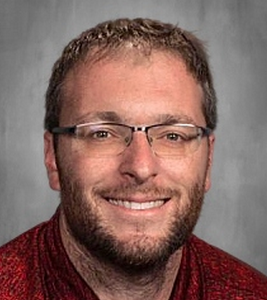![]()

It’s been an exciting past couple of weeks for Chadron High School Social Studies teacher Michael Sandstrom.
First, he became one of 24 middle and high school teachers from across the nation to be selected for the Bill of Rights Institute’s National Teacher Council, which helps shape curricula and programs for educators and students
Then Sandstrom was given the Nebraska State Council for The Social Studies Outstanding Teacher Award for the 3rd Congressional District – an honor he received in his classroom by Council Co-President Katrina Gotschall via Zoom.
He admits he was surprised by both honors, but especially by the 3rd District Award – or at least by learning about in his classroom in front of his students by Gotschall with the assistance of Chadron High Principal Jerry Mack.
Sandstrom was nominated for that award by his wife, Chadron Primary School teacher Sheyenne. In her nomination, she cited his “dedication to students and his ability to connect those students with the history of their community.
Sandstrom’s selection for the Bill of Rights Institute’s Teacher Council was less of a surprise if for no other reason than he’d applied for it and knew it was a possibility he might be selected.
A Virginia-based non-profit, the Bill of Rights Institute advances civics and history education through market-leading curricula and educational experiences for teachers and students.
Through the Teacher Council, it gives teachers a direct voice in helping to influence key resources and initiatives that affect their fellow educators and students.
A Chadron High School and Chadron State College graduate, Sandstrom was the 2019 Nebraska History Teacher of the Year and the 2021 recipient of History Nebraska’s Excellence in Teaching Award.
He was also a finalist for the Nebraska Teacher of the Year Award from the Nebraska State Department of Education in 2021
Original text in the nomination form submitted to the Nebraska State Council For The Social Studies.
“Michael Sandstrom is an excellent candidate for the Paul Beck Outstanding Teaching and the 3rd Congressional District Teaching Awards due to his dedication to students and his ability to connect those students with the history of their community.
Michael has been recognized as the Nebraska History Teacher of the Year by Gilder Lerhman in 2019 and as the recipient of History Nebraska’s Excellence in Teaching Award in 2021. The Nebraska State Department of Education also selected Michael as a Finalist for the Nebraska Teacher of the Year Award in 2021.
He received those awards in large part due to his use of primary sources in the classroom including documents, objects, and other classroom resources. Part of the recognition also revolved around the partnership he helped create between his local museum, the Dawes County Museum, and his school where he brings students every semester to research at the museum on various topics.
Michael’s energy and dedication is exceptional, which has set him apart from many in his field, but he is also a historian dedicated to perpetuating the knowledge of his local community.
Michael’s impact on his students, colleagues, and community goes beyond the recognition he has received. Michael believes that connecting the national events that students learned about in U.S. history class with their local community is vital in their understanding of how their lives are impacted by state and national events.
The best example of this is Michael’s research into Dawes County and how it was impacted by the Great Depression and Franklin D. Roosevelt’s New Deal programs. As a result of this research, he has published, or is in the late stages of publishing, three articles through the Great Plains Quarterly and History Nebraska.
The three article titles are: Travails of the “Magic City”: A History of Dawes County as it Entered the Great Depression, 1929-1932, The “Magic City”: A History of Dawes County and Franklin D. Roosevelt’s New Deal, and Chadron State Park: A Monument to the Civilian Conservation Corps and Company 762.
This research has allowed Michael to point out buildings, landmarks, and improvements made by workers during Roosevelt’s administration that are still prominent today. This knowledge also connects students with history more deeply than simply learning about decisions that occurred in far off places with few consequences for their daily lives.
Overall, Michael’s impact on students, colleagues, and his community are too many to be outlined in a short endorsement, but he is certainly worth your consideration for these awards.”

Congratulations, Michael! Chadron students are lucky to have you teaching in the system.